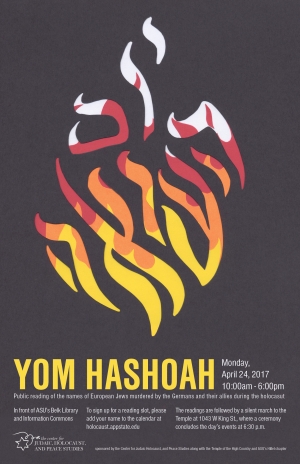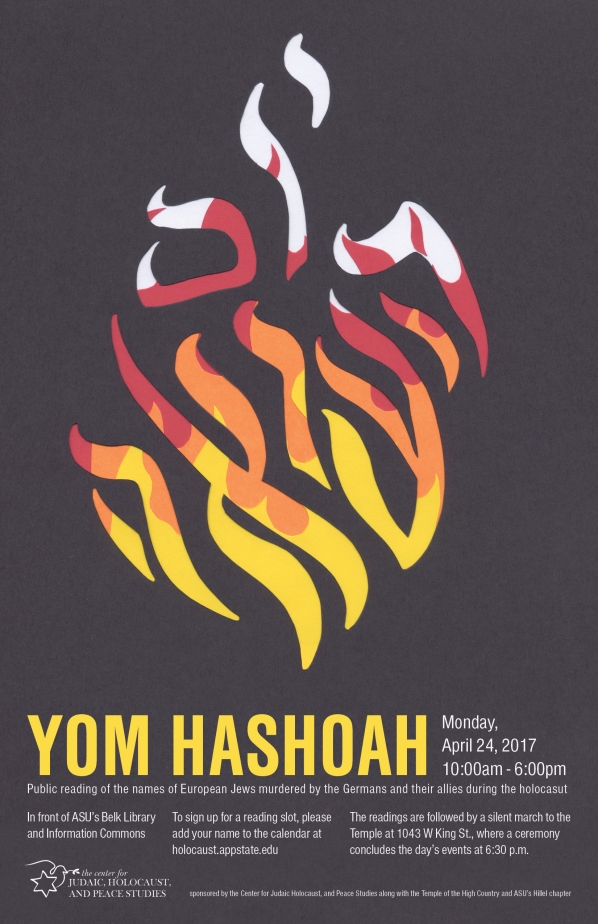On Monday, April 24, 2017 Yom HaShoah (Holocaust Memorial Day), the Center for Judaic, Holocaust and Peace Studies along with the Temple of the High Country and Appalachian State University’s Hillel chapter will organize a public reading of the names of European Jews murdered by the Germans and their allies during the Holocaust. This reading is scheduled to take place from 10 a.m. until 6 p.m. outside, in the square between Belk Library and Information Commons and the University Bookstore at the end of College Street.
After the readings, participants will walk in silence to the Temple of the High Country at 1043 West King Street in Boone, led by Hillel President Marisa Fernandez, Skip Rackmill and members of the Temple to participate in a ceremony that encompasses the lighting of candles and the saying of the mourner’s Kaddish starting at 6:30 p.m. Appalachian students, staff, faculty, members of the Temple and the Boone community are invited to participate in the days events including signing up for one of the ten-minute reading slots available throughout the day.
The United States Congress established the Days of Remembrance as the nation’s annual commemoration of the Holocaust. This genocide was the state-directed, systematic destruction of six million European Jews and millions of others, ranging from homosexuals and Soviet prisoners of war to Roma to people with real and imagined disabilities by the Germans and their collaborators between the years of 1933 and 1945.
Since 1982, the United States Holocaust Memorial Museum created by Congress as a permanent living memorial to this genocide’s victims, has organized and led the national Days of Remembrance ceremony in the United States Capitol Rotunda. Year after year, the museum staff marks this event with Holocaust survivors, liberators, members of Congress, White House officials, the diplomatic corps and community leaders.
The recalling of the names of the deceased and murdered is not only an important part of Jewish religious practice, it also serves as a practice for individuals of all backgrounds, faiths and cultures to commemorate the victims. Much more than a devastating part of Jewish history, the Holocaust is truly an event in global history. The Holocaust’s crimes of unimaginable cruelty offer opportunities to recommit to the need for respect for all people and to reflect on the moral responsibilities of individuals and communities today.
"There are many ways to remember the Jews murdered by the Germans. The recitation and remembering of names of those who perished--so important in Jewish tradition--is especially meaningful. It is a way to pay tribute and to learn that the mere awareness of abstract numbers of victims often found in textbooks cannot achieve,” said Dr. Thomas Pegelow Kaplan, Director of the Center for Judaic, Holocaust, and Peace Studies.
To sign up for a ten minute reading spot, visit this schedule. For more information on the public readings, please contact the Center for Judaic, Holocaust and Peace Studies at 828.262.2311 or email holocaust@appstate.edu. To participate in the ceremony at the Temple of the High Country, please email templeofthehighcountry@gmail.com or contact Hillel President Marisa Fernandez at fernandezme@appstate.edu. For parking information while on campus, visit campus maps, https://maps.appstate.edu/.
###
About the Center for Judaic, Holocaust and Peace Studies
Appalachian State University's Center for Judaic, Holocaust, and Peace Studies was founded in 2002 to develop new educational opportunities for students, teachers, and the community. Located administratively within the College of Arts and Sciences, the Center seeks to strengthen tolerance, understanding, and remembrance by increasing the knowledge of Jewish culture and history, teaching the history and meaning of the Holocaust, and utilizing these experiences to explore peaceful avenues for human improvement and the prevention of further genocides.
About the College of Arts and Sciences
The College of Arts and Sciences is home to 16 academic departments, three stand-alone programs, two centers and one residential college. These units span the humanities, social sciences, and the mathematical and natural sciences. The College of Arts and Sciences aims to develop a distinctive identity built upon our university's strengths, traditions and unique location. Our values lie not only in service to the university and local community, but through inspiring, training, educating and sustaining the development of our students as global citizens. There are approximately 5,850 student majors in the college. As the college is also largely responsible for implementing Appalachian's general education curriculum, it is heavily involved in the education of all students at the university, including those pursuing majors in other colleges.
About Appalachian
Appalachian State University, in North Carolina’s Blue Ridge Mountains, prepares students to lead purposeful lives as global citizens who understand and engage their responsibilities in creating a sustainable future for all. The transformational Appalachian experience promotes a spirit of inclusion that brings people together in inspiring ways to acquire and create knowledge, to grow holistically, to act with passion and determination, and embrace diversity and difference. As one of 17 campuses in the University of North Carolina system, Appalachian enrolls about 18,000 students, has a low student-to-faculty ratio and offers more than 150 undergraduate and graduate majors.

